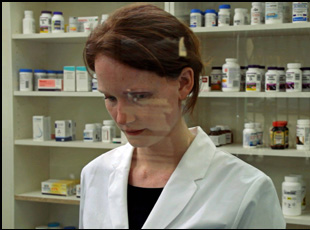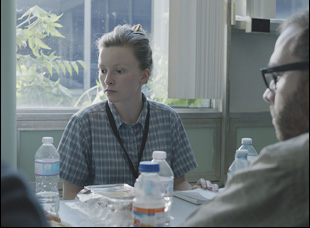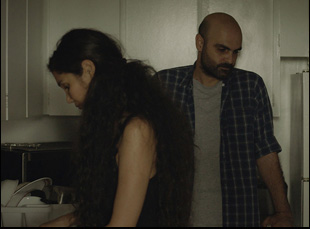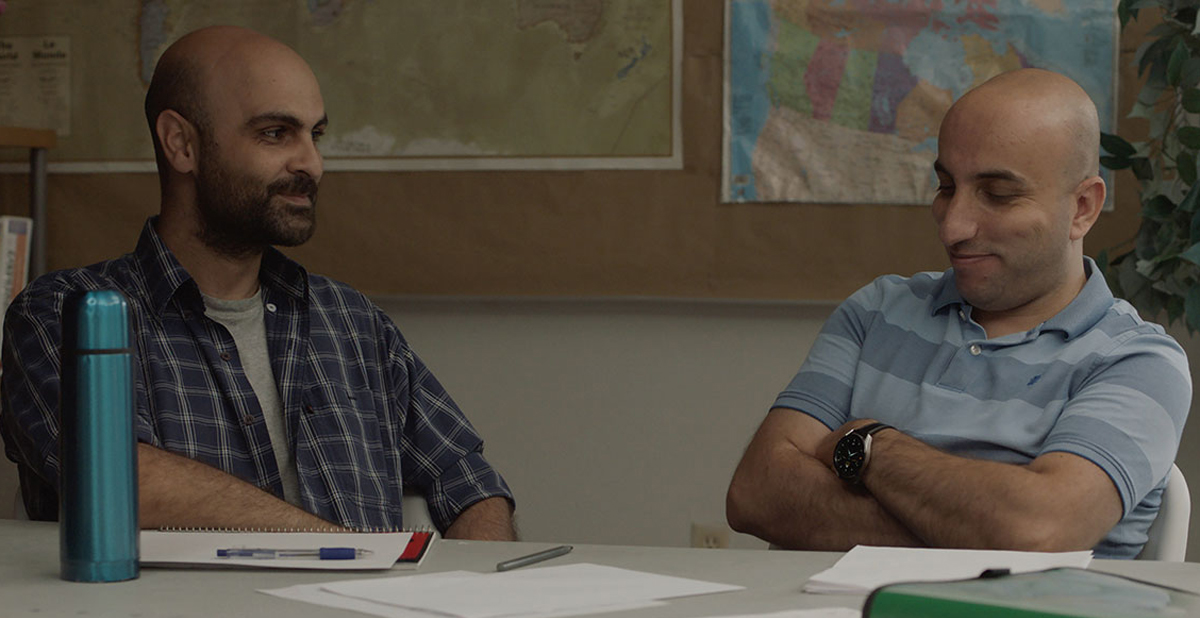The first time Antoine Bourges enjoyed a major retrospective of his work, he couldn’t appear in person. Hopes for the Cinematheque in his longtime hometown of Vancouver to reopen in the fall of 2021 gradually diminished as new surges in COVID reared their ugly head and the films were screened virtually, though given his intense focus and his unique creative process, it had the unusual effect of giving local audiences a chance to feel as if they could step outside again when as he would tell Cinematheque programmer Shaun Inouye that the reason he started making films in the first place was so that life wouldn’t pass him by, saying “Cinema, when pointing a camera at these types of experiences, would allow me to feel them more than I was feeling them in real life. Things were too fleeting in real life and by making a film out of things that were around me, I could actually have a truer experience of them.”
Bourges is too young to have a large body of work, but it is already worthy of a celebration, often cultivating relationships within the community around him to tell rich stories happening right in of us but typically overlooked in a culture too busy to probe deeper. From his 2010 short “Woman Waiting,” in which the vast snowball effects of poverty were observed in a mere 14-minute portrait of someone hoping to secure more stable housing, to his latest feature “Concrete Valley,” settling into a Syrian-Canadian enclave in Toronto where a marriage is on the rocks, his films show a deep compassion for subjects who overcome insurmountable odds simply by carrying on in their daily lives and meticulously examine the institutions that govern their existence. In watching his films collectively, you can also see an evolution in his practice from his 2012 mini-feature “East Hastings Pharmacy,” where he found a panoply of experiences in setting up his camera in a waiting room for people to take their medicine, then flipping to the other side of the counter for his first full-length feature “Fail to Appear,” starring Deragh Campbell as a social worker who learns there is more than what she’s learned of proper protocols involved in her work with preventing people from falling through what’s left of the social safety net.
As his productions only increase in their sophistication, Bourges’ films have impressively retained an undeniable authenticity about them and unforced yet powerful observations about society, addressing far more wide-ranging circumstances than the ones immediately at hand for his characters and this weekend, the Metrograph in New York is bringing the filmmaker in for a full-fledged tribute with both his shorts and features shown theatrically and “Concrete Valley” made available to stream via Metrograph at Home. Before the festivities commence, Bourges graciously spoke about his career so far, how his filmmaking methodology has evolved and making films that simultaneously chronicle a specific time and place in his own life yet have spoken to so many others.

It’s great. I don’t call it retrospective, just because as you hint at, it’s not like I have an insane amount of work, so I think of it [more] as “All my films are playing.” I don’t really use the R word. But it’s really nice just to think they’re all going to be playing together, especially outside of Canada and in New York. It’s making me reflect a little bit on these specific works a little bit more now.
Given how there has been this blend of narrative and nonfiction methodology in your films, has the approach actually changed over the years?
It’s always been case by case and film by film. I’ve tried to rationalize a trajectory at some point to move towards one more or more another, and then I stumble upon an idea and I start trying to write it and meet people. Then it always ends up being its own kind of fiction with documentary elements. I just choose to not think about it too much and I hope the work gets better, or at least that I’m better able to kind of capture and convey the kind of nuances or complex things that excite me when I think about a project and I want to make a film about it. I also hope that being older makes me a bit better as an observer. But I don’t know where things are going, to be honest. Even with whatever I’m working on now, I’m still very open about the kind of hybridity or non-hybridity that it will have.
How did you first see the cinema in these institutional interactions?
It’s always a little bit different depending on the film. Usually, I find that when there is something that presents kind of a resistance to my observation, but that feel that there’s something there, then I feel like there could be a film. I know that sounds a bit abstract, but just thinking about a lot of the films have people that work in institutions, [especially] related to care or the law, often you sense that you’re seeing protocols or these very normalized ways in which people interact and ask for things or try to get things and behind that obviously, there’s a human aspect and sometimes that is being repressed, either by the institution or by the person themselves [who is] being subjected to an institutional kind of relationship. And when you sense that, “Oh, there’s a human thing that is not being released and that it is being kept away from you, that’s when it incites you to be more curious and actually want to know more. So when you feel like, “If I’m feeling this curiosity and this sense of tension, I feel like a film should see it too.”
Another that’s been interesting when watching your work evolve over time is who it centers – your earlier films, which often concern medical matters, moved from those receiving care to those in charge of it. Has that been a conscious decision?
Yeah, that was something that’s always interested me and part of my research — about how human relationships can exist within a system and even how humanity is represented by a system. For instance, in “Fail to Appear,” one of the starting points of the film was an actual court referral that a case manager friend of mine had shared with me. Obviously, I never revealed the name of all the private information from that court referral, but we replicated that because there seemed to be a human story behind it. The court referral itself is a very dry administrative document, but I find that when you go behind the scenes to see where people like this case worker [in “Fail to Appear”] work and what they have to start with, there’s something interesting about what you can find and what you can guess from seeing these kind of documents.

In the beginning, it was very much about being there. The first films that I made were in Vancouver, and I actually lived around that neighborhood of the downtown Eastside and being around that environment all the time first made me very curious about it, [particularly] the people working with people on the street. Being around that was very necessary for me, not so much to maintain an interest, but to maintain this mystery that it was all around me and for years, I would walk past it [before] eventually [asking myself], “Okay, what is happening actually here?”
When I moved to Toronto, a lot of these questions were still a bit unresolved, so in “Fail to Appear,” even though it was made in Toronto years after I’d moved from Vancouver, the genesis of the film comes from questions that I asked myself when I was living in Vancouver and where I was observing these case workers and what they call their clients hanging out together and having these informal conversations. So it is very much about being in an environment and seeing it around me. My most recent film “Concrete Valley,” [is set in] Thornecliffe Park, [which] is in Toronto, but it’s not really where I live and it was a little bit of a different process for me because I would really have to go there often and spend a lot of time, not necessarily collecting specific research data or elements, but just to feel it and hear the sound of being in that location and smell it. That’s very necessary for me in order to be able to write.
How did “Concrete Valley” start out for you? It’s somewhat of a break from your previous work in terms of subject.
I had this vague desire at the time to make a film about a couple and that weird space that is a bit opaque, that is like the beginning of the end of a relationship where neither people really know that it’s the beginning of the end. That stayed with me, but I didn’t know what to do with that idea and I didn’t have anything quite tangible to attach it to. I was driving around, because I had a car for a minute in Toronto, and I found this neighborhood that I became pretty fascinated by just from the architecture and the way that it felt quite secluded from the rest of the city. This neighborhood turned out to be a place with new immigrants, so I decided to spend more time there and I was able to attend some of the English classes for immigrants without really knowing what I was going to do. But eventually it became clear that this idea of making a film about a couple could also be fleshed out through working with the people that I was meeting there.

There’s a feeling that I have that was very much there when my co-writer Teyama Alkamli, who’s a Syrian filmmaker based in Toronto, and myself were writing, trying to tap into this feeling of being away from another place and where we feel like maybe we ought to be — this feeling of having a parallel life that is always in our mind, even though we’re living this life. So I was interested in exploring that and exploring a character that would really struggle with that and who maybe would not be able to be fully in one life and not fully in the other. But my own personal experience is very different from that of a Syrian refugee. I came to Canada from France to play sports. I was a hockey player, and I lived in Montreal when I was a kid and played hockey for a long time, just because I was trying to become a pro, so that feeling of displacement or disconnection actually came much later. When I was younger in Montreal, I felt I just thought about playing hockey, to be honest. I didn’t have any of these existential questions.
The NHL’s loss was clearly the film world’s gain. And as I understand it, because of COVID protocols, you may have had to structure this shoot differently for “Concrete Valley” than you had in the past. Did it change the outcome?
We were lucky because we shot shortly after vaccines were being released and and we didn’t have a single case on set, so the main difficulty came with communicating with people and being able to direct actors wearing a mask.I didn’t think it would be that complicated, but it was coupled with the fact the people I got along with were the Syrian people from the community, so a lot of the film ended up being in Arabic because this couple speaks Arabic at home and I don’t speak it myself. So there were communication problems, but I think the film in the end the problems of communication are very much the theme of the film. I was also worried for a moment because the film is about someone who goes to see his neighbors as an unlicensed doctor to the people in his community, and obviously during COVID, no one would open their door to someone, so that was a real issue. But quickly we decided that we’ll make the film as it was initially written and that hopefully one day they won’t be COVID and people can watch this film and believe in it.
It speaks to a specific time in all our lives, but yours as well. With this series, is it fun to look back as a time capsule?
I think about that all the time when I watch the older stuff, like “Woman Waiting,” my first short, because I see objects in frame that just belonged to me that I happen to put there as props. You just totally forget about that object because it was like 14 years ago, but film is interesting that way because obviously you’re telling stories, but you’re also documenting people, things, the feeling of a place and all these things change over time, so even if you make a purely fictional work, there are things being documented. You really pay attention to that when you watch the films [from the present vantage point], and what I find is that the older a film gets, the less I remember the process of making it, the more I can actually just watch it as a film and not [think], “Oh, yeah, that day when we shot, the lunch was terrible.” I can abstract that and just slowly start getting into the film and that’s nice because with the distance, I can actually see the film maybe a little bit more like a spectator and try to figure out what I was actually trying to explore or say. I find that interesting too.
“Concrete Valley” opens on February 23rd in New York at Metrograph as part of the series “Minding the Gaps: Films by Antoine Bourges,” and will be available to stream via Metrograph at Home.




